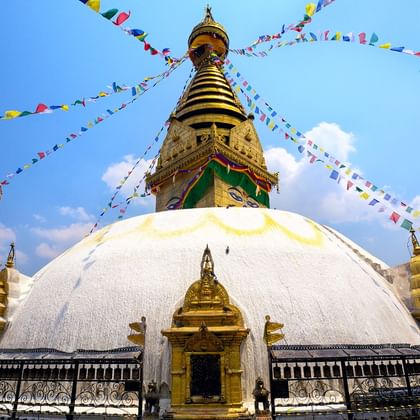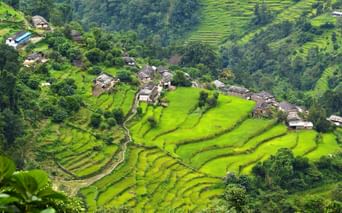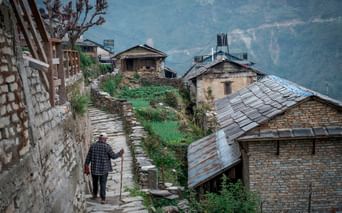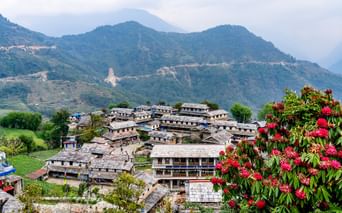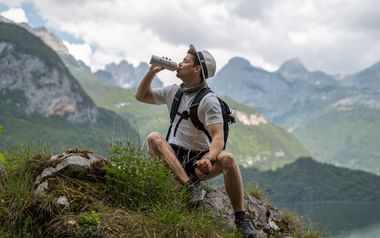Free cancellation up to 35 days before departure
This tour is covered by our special free cancellation policy up to 35 days before departure.
Itinerary
Upon arrival in Kathmandu, you'll be met at the airport and taken directly to your hotel. After completing the check-in formalities and taking a short rest, a guide will take you to Thamel market - the buzzing tourist centre where you can have dinner, exchange money, stock up on equipment and any items from the supermarket. You'll visit the guide office in Thamel to complete the remaining formalities for trekking permits and be introduced to your local tour guide - should you arrive late by plane, the trip to the office will be moved to day 2.
Hotel (example): Kathmandu Garden Home
After breakfast, enjoy a city tour of Kathmandu and visit Swayambhunath (Monkey Temple), the oldest and most enigmatic of the Kathmandu Valley shrines. The stupa's white elevated dome and golden spires can be seen from afar from all directions. The area around the stupa is filled with temples, painted idols, Tibetan prayer wheels, tantric statues and many other religious artefacts. You'll also pass by Pashupatinath and Boudanath. Pashupatinath temple, the largest Hindu temple in Nepal, is dedicated to the god Shiva. The temple is a UNESCO World Heritage Site and attracts millions of pilgrims from all over the world. Here you'll also meet the colourful Saddhas, holy men who have dedicated their lives to Hinduism. Boudhanath Stupa is located in the far east of Kathmandu and is the holiest Tibetan Buddhist temple outside Tibet and the largest stupa in Nepal.
The city tour takes approximately 6 hours.
Hotel (example): Kathmandu Garden Home
The guide will pick you up at the hotel and together you will drive to the airport for the short flight to Pokhara (approximately 25 minutes). Upon arrival in Pokhara, drive to Kande (approximately 1 hour). From here, you'll start your first hike of the tour with breathtaking views of the Annapurna range and Fishtail Mountain. The hike leads you quietly along small trails up to the Australian camp where you spend the night. From the camp area you can enjoy the sunset over Annapurna 2,3,4 and Annapurna South - all +7000m peaks. There are also views of Machhapuchhre (Fishtail. Mt) which, with its distinctive profile and 6,998m, is particularly impressive.
Overnight stay: Australian camp - Teahouse (M,F,A)
Wake up with a steaming cup of tea and stunning views of Annapurna and Fishtail (weather permitting).
Today's trekking start takes you along the ridge to Deurali. There will be occasional stretches through forest and small mountain villages, including Tolka: a beautiful magar and Gurung characterised village. You'll continue along the trail with stunning views of Annapurna South. From here the trail descends through sporadic forests, terraced landscapes and small villages to Landrung.
Overnight stay: Tea House (M,F,A)
After Landrung, the trail descends steeply to the Modi Khola River, which you cross on a swinging suspension bridge. On the other side of the river, the trail climbs steeply again to Ghandrung. There are many teahouses, a Gurung museum and traditional houses built of stone slabs. From Ghandrung there are views of Annapurna South, 7,229m, Hiunchuli, 6,441m, Annapurna III, 7,755m, Tarke Kang, 7,193m and Fishtail Mountain (Machapucchare) 6,993m. Visit to ACAP. Annapurna Conversation Area Project is Nepal's largest protected area with a rich biodiversity. The area is home to 1226 flowering plant species, 102 mammal species, 474 bird species, 39 reptile species and 22 different kinds of amphibians.
Accommodation: Teahouse (M,F,A)
After breakfast, you'll spend the last few hours hiking along trails through small villages and terraced fields down to Syauli Bazaar, where you'll have lunch before being driven back to Pokhara. Here you'll have time for some relaxation after some great hiking experiences.
Accommodation: 3-star hotel in Pokhara (M,F)
Pokhara is Nepal's second largest city and is magically located at the foot of the Annapurna Mountains.
Today you'll go sightseeing in the area. You'll visit Gupteshwor Cave and Devi's Fall (Patalo Chango). The cave and the waterfall are beautifully situated opposite each other. You'll then head to the International Mountain Museum, which beautifully tells the impressive and gruesome stories of Himalayan climbs, including Mount Everest. After the museum visit, it's time for a sailing trip on Lake Phewa, the five square kilometre lake in Pokhara, which offers a magnificent view of the mountains reflected on the lake's surface. Afterwards, head to the hotel where the rest of the day is at leisure. In Pokhara, there are plenty of restaurants and shops at Lakeside, so the evening is sure to be entertaining.
Sightseeing: approximately 5 hours.
Accommodation: 3-star hotel in Pokhara (M)
After breakfast, you'll be driven to Chitwan National Park where you'll be welcomed with drinks and an introduction to the park and your rooms.
After enjoying lunch, there is a cultural excursion to a Tharu village where you will be introduced to the daily life and chores of the Tharu people in a tourist-friendly manner. Dinner is served back at the resort.
Overnight stay: Standard resort in Chitwan (M, F, A)
The day starts with an early wake-up call and breakfast, after which you set off down the river by canoe. It's a great experience to glide down the river and watch the crocodiles basking in the early morning sun. After the canoe trip, you'll visit the local elephant breeding centre to learn about the life of the elephants in the park. You'll head back to the resort for a hearty lunch, followed by a jeep safari tour. The tour takes you into the jungle, where there are good opportunities to meet armoured rhinos, deer and wild elephants. If you're very lucky, you'll also meet the Bengal tiger. Dinner will be served at the resort after another day full of adventure.
Accommodation: Standard resort in Chitwan (M, F, A)
Early in the morning, wake up and have a quick cup of tea or coffee before going on a short bird-watching tour. Breakfast is served at the resort.
Then it's off by car to Charaudi on the banks of the Trisuli River. It is from here that you will go river rafting. Your rafting guide will meet you after lunch, where a lesson on river safety and important paddling techniques will be given. Once the lesson is over and all questions are answered, the river adventures begin wearing life jackets and helmets. The river trip stops at the Fishing Village where you will stay overnight at a resort.
Bird watching tour: approx. 1 hour
Transfer to river rafting: approx. 2.5 hours
Rafting trip approx. 3 hours
Overnight stay at local resort. (M, F, A)
The day starts with an early morning and a review of the day's rafting and paddling techniques. The river takes you through a forest gorge with impressive geo-landscape. The flowing Marsyangdi River joins the Trisuli River at Mugling village, greatly increasing the volume of water in the river. After a sizzling and adrenaline-fuelled river trip, you'll have time to relax in the car as you drive back to Kathmandu.
Rafting trip approx. 3 hours
Transfer to Kathmandu approx. 4 hours
Hotel (example): Kathmandu Garden Home ( M,F)
Kathmandu is a mysterious and wonderful place. This historic city is mainly inhabited by the Newars, whose history and traditions have made the city what it is today. Following the age-old traditions and divided into both Hindu and Buddhist faiths, this people group has greatly contributed to Nepali culture, art, trade and cuisine.
On this half-day walking tour of Kathmandu you will explore Ason/Asan Bazzar, Indra Chowk, various narrow shopping streets and visit Chaityas, courtyards and the guide knows both the tourist attractions and the local secret gems. The tour concludes with a visit to Durbar Square
Kathmandu Durbar Square, a UNESCO World Heritage Site and also known as the Basantapur Durbar area, was once the centre of power in Nepal, where the Malla and Shah kings ruled between the 14th and 18th centuries and the 18th and 20th centuries respectively. Various temples, shops, courtyards and ongoing festivals and celebrations keep this square alive all year round. The famous Kumari temple and the living goddess Kumari is the main attraction of the square.
Guided walking tour approximately 4 hours.
Hotel (example): Kathmandu Garden Home ( M)
This day is at leisure in Kathmandu. We highly recommend visiting the Kathmandu Valley's two ancient royal cities, Patan and Bhaktapur. Both places have a wonderful atmosphere and it is very cosy to stroll around the narrow streets and visit the fine old temples. Alternatively, you can buy souvenirs and gifts to take home from Thamel or the city's small markets.
Hotel (example): Kathmandu Garden Home ( M)
After breakfast, you check out of the hotel. If your departure is in the evening, you'll have the day to do your final shopping before being driven to the airport for your flight home.
Pictures from the trip













Prices and dates
Price includes
- 5 nights stay at 3-star hotel in Kathmandu
- 2 nights stay at 3-star hotel in Pokhara
- 3 days/2 nights stay at a resort in Chitwan, including all meals, safari tours and other activities
- 4 days trekking in the Himalayas with overnight stay in teahouses
- All meal times except Kathmandu and Pokhara where only breakfast is included
- All meals on the trek ( including hot drinks 3 times daily)
- Flight from Kathmandu to Pokhara
- 2-day rafting trip as per programme, including equipment and meals
- 2 sightseeing tours in Kathmandu as per programme
- Trekking guide and porters for luggage transport
- 1 sightseeing tour in Pokhara
- Briefing with our staff and local guides upon arrival in Kathmandu
- Transport from/to the airport (always private transport)
- Land transport (always private transport)
- All temple tickets on Kathmandu sightseeing tour
- All trekking permits (remember to bring passport photos)
- Sherpa guide, porters and any pack animals for transporting your luggage on the trek (no need to carry your own luggage)
- Food and drinks, cabins, above average salary, insurance, medical equipment, flight tickets, ground transport for trekking staff
- TIMS (Trekker's Information Management System)
- Access permit to the Annapurna area
- Free loan of a backpack (approx. 75 litre backpack in which you can pack your belongings for the trip. Handed out in Kathmandu)
- Free loan of sleeping bag (provided in Kathmandu)
- Free loan of down jacket (provided in Kathmandu)
- All taxes and fees
- 24-hour local and international service hotline for the duration of the tour
- This is a package holiday and is covered by the Travel Guarantee Fund and the Package Travel Act - see what benefits this brings you - click here
- Transportation to/from the destination
- Lunch and evening meals in Kathmandu and Pokhara
- Drinks (alcohol, soft drinks and other cold drinks)
- Travel insurance and cancellation insurance
- Tips (expect around 60-100 USD per person)
- Handling fee (€25)
- Visa to Nepal (we recommend applying from home, but this can also be done at the airport on arrival)
Practical information
The price is based upon two people sharing. It is also possible travel alone in a single room. Simply choose "1 person" in the booking form and it will automatically add the single room surcharge.
Notice: If you open the booking form, fill it out and go to page two, you can save your quote and have it sent to your email as a pdf. This way you can easily send it to others who can then see the price and exactly what is included. When you have saved the quote you can easily restart the booking and you will not need to enter all the information again.
The flights to/from Kathmandu are not included in the price. You can easily find a suitable flight via a flight booking engine such as Momondo or Skyscanner.
Notice: we recommend that you book with us and wait for the confirmation before you book your flights.
Airport transfers
When you arrive at the airport in Kathmandu, you will be picked up and brought to the first hotel. It does not matter what time of day you arrive.
It works like this:
- You book your chosen holiday with us
- We confirm your holiday (usually within 48 hours)
- You arrange your transportation
Get a quote
If you prefer that we handle your flight, then we would be happy to arrange this for you. You simply book a quote below the map on this page and we will return with a quote as soon as possible (usually within 48 working hours). Please note that we add a handling fee of 45 euro to each flight and this means that the flight will be cheaper if you book it yourself.
Notice: This is a group tour which requires a minimum number of participants. We urge you to wait with booking your flight until you have recieved the final confirmation from us. We will confirm two months before depature at the latest.
Airport Transfer
Transfer to/from the airport in Kathmandu is included in the price, and you will be picked up regardless of the time of day you arrive.
In Kathmandu and Pokhara you will stay in a centrally located tourist class hotel. Breakfast is included at the hotel. On the trek you will sleep in small local teahouses, or lodges, as they are called in Nepal. The lodges are small guesthouses run by local families. The quality varies, but our guides strive to be book the best lodges for you, but you must be prepared, that the lodges are in relatively primitive conditions. You will usually find blankets on the beds, but they are not warm enough at high altitude and you must bring your own sleeping bags on the trek. Some places it is possible to get a hot shower, which typically consists of a bucket of hot water. Please make sure whether the water is heated by solar energy in order to protect the vulnerable forest growth.
In Kathmandu and Pokhara, breakfast is included in the price. Lunch and dinner is not included. There are plenty of nice restaurants located near the hotel and you can also eat at the hotel. It is usually cheap to eat at restaurants. On the trek breakfast is included, but you will will have to buy lunch and dinner at the lodges. The menus are basically the same in all lodges, but it is good solid food with lot of meat, rice, potatoes and vegetables. You can buy pure bottled water as well as soft drinks. hot tea, coffee and beer in most lodges. All meals are included during the stay in Unique Wildlife Resort in Chitwan National Park.
A typical day on the trek begins with a wakeup call at 06:30. After breakfast you pack your gear and the trek start around 08.00 - 08:30. Around 12:00 you will have a nice long lunch break, before continuing on the afternoon trek. There will be plenty of rest breaks during the day. You will arrive at the lodge mid/late-afternoon. Dinnertime is around 18:00.
This trip has difficulty level 2-3, which means that most hiking days are level 2, with a few at level 3.
Grade 2
Easier hikes on reasonably good trails. Daily hikes will last 4-6 hours in hilly terrain. Anyone in generally good physical condition can participate. Luggage is transported, and you only carry a light daypack. Requires well-fitting footwear such as trekking shoes or hiking boots.
Grade 3
Hiking in mountainous terrain with longer ascents and descents. You will hike 5-7 hours a day. Requires generally good fitness and health, but no special technical skills or prior experience. Requires good shoes, such as trekking or mountain boots.
Read more about our grading system here.
Area: 147,181 km²
Population: Approximately 26 million
Religious Holidays/Festivals
Nepal is primarily a Hindu country, heavily influenced by Buddhism. Therefore, there are many religious holidays. Several of the major holidays fall during trekking seasons and can affect activity levels. Take it easy if things don't go according to plan; everything always works out. Diwali is a major Hindu festival of lights also celebrated by Buddhists, among others. The celebration symbolizes the victory over evil. Diwali also honors the Hindu goddess Lakshmi, who represents prosperity, wealth, and beauty. The festival days vary with the lunar calendar each year. In 2016, Diwali is celebrated in the last week of October.
Electricity
You can charge batteries at lodges and hotels. The power voltage is 240 volts, but it can vary greatly in the mountain areas. It is recommended to bring a multi-plug adapter with several options.
Phone and Internet
Country code: +977
Remember to disable automatic updates, data roaming, etc., on your phone/tablet to avoid a surprisingly large bill when you return home. There is increasingly Wi-Fi in many teahouses in the Annapurna area. There is network coverage in many places during the trekking tour, but it is expensive to call home, so many choose to stay in touch with family via SMS. However, there will be areas where it is not possible to get a connection.
Language
Nepal's official language is Nepali, but many dialects are also spoken. Our local guides speak English well, though usually with an accent. In hotels, teahouses, and shops, English is also spoken well. The porters on the trekking tour do not always speak English very well (and yaks not at all!).
Dress Code
In general, the dress code in Nepal is very relaxed, even at the better hotels. It is important to dress with respect for religion and local customs. Therefore, dress modestly and consider when it is appropriate to wear shorts, especially if you are visiting temples and monasteries. It is good etiquette to have your shoulders and knees covered.
Time Difference
Nepal is 4 hours and 45 minutes ahead of Denmark and 3 hours and 45 minutes ahead of Denmark when we have daylight saving time.
Photography
There are countless photo opportunities in Nepal, so make sure you have enough space on your memory card. Show respect for people and ask for permission before taking pictures of them.
Currency and Price Level
The local currency is the rupee (NPR). In Kathmandu, there are many ATMs where you can withdraw money, as well as exchange offices where you can exchange cash in dollars and euros. We recommend that you withdraw/exchange an appropriate amount for the trekking tour before leaving Kathmandu. Most teahouses only accept rupees as a means of payment. Check www.valutakurser.dk for current exchange rates.
Tips
It is customary to give tips in Nepal. In restaurants, the amount is rounded up to about 10% of the bill. It is also common to tip guides and porters, and you should expect to give approximately 80-120 US dollars in tips per person. A good rule of thumb is that for every 10 USD the guide gets, the porters get 6 USD.
It is the customer’s responsibility to have a valid passport. It is also the customer’s responsibility to seek and obtain any necessary visa for travelling to the booked destination. Your passport must be valid for at least 6 months after the expected return. Note that there may be special visa requirements for different foreign nationalities. Please note that processing time for visas to some countries may be several weeks. Bering Travel have no responsibility for any lack of travel documents. Be aware of any transit visa requirements.
We advise you to contact a medical specialist or you personal doctor or a licensed vaccination clinic. Please note that you should bring your vaccination certificate when you travel to Nepal.
We recommend taking out travel insurance that covers at least illness, accident, repatriation, lost holiday, luggage and liability. As a customer, you are responsible for taking out the necessary travel insurance to cover these costs.
Before taking out insurance, you should check whether you are already covered by travel or cancellation insurance through your home insurance company, credit card or similar - please note that there may be differences in insurance coverage.
After booking this trip, you get access to various discount schemes.
This tour can be arranged from Janurary to mid-May and from mid-September to December. June-September is monsoon rainy in Nepal, so the weather is a bit heavy and the rivers too full for rafting. During the rest of the year, the weather is usually clear and the mornings and mornings are sunny. During the afternoon, clouds usually form from the evaporation of snow in the mountains, and then it often clears up again in the evening. In spring and autumn temperatures are around 25 - 30 degrees. It is a little cooler in winter, especially on the trek.
Here is no text
Travelling to Nepal is always an adventure and you should be prepared for changes along the way. Bering Travel and our good partners always strive to carry out the trips according to the programme, but there may be local conditions and situations where it may be appropriate to adjust the programme along the way. For example, political or natural conditions may cause the guide to change the programme. It may also be the physical ability of the participants, unsuitable climbing weather or delayed flights that require changes to the programme. An extra day is included for summit attempts to maximise the chances of success. It will always be the main guide's decision whether it is safe to attempt the summit. We and our partners always do our best to execute the promised programme, but we are not master of the weather and wind, so if there are changes along the way, take it as an experience.

"We look forward to making your holiday dreams come true"
